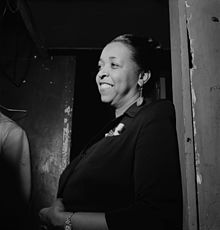Supper Time
"Supper Time"is a popular song written byIrving Berlinfor the 1933 musicalAs Thousands Cheer,where it was introduced byEthel Waters.The song is about racial violence inspired by a newspaper headline about alynching.
History
[edit]Berlin wrote the musicalAs Thousands Cheerwith the librettistMoss Hartin Bermuda.[1]Berlin's biographer,Laurence Bergreen,described it as "the best work he had ever done for the stage" and consisting of "nothing but hits".[2]The score included the songs "Easter Parade","Harlem on My Mind","Heat Wave"and"How's Chances?"in addition to" Supper Time ".[2]The musical was a satirical revue of recent events that had made news headlines with parodies of PresidentHerbert Hoover,John D. Rockefeller Jr.,Barbara Hutton,Noël Coward,Edward, Prince of Wales,andJoan CrawfordandDouglas Fairbanks Jr.[2]
Context and composition
[edit]Berlin first met Waters in the spring of 1933 during her headlining appearances at theCotton Clubin Harlem.[3]Berlin was immediately impressed by Waters and wanted her forAs Thousands Cheer.[3]Water's subsequent performance inAs Thousands Cheermarked the first time that a black woman had ever starred in a Broadway musical.[3]"Supper Time" was introduced by Waters as the second song of Act II of the musical.[4]The song followed "Metropolitan Opening" a sketch about the economic woes of patrons at New York'sMetropolitan Operaduring the recentGreat Depression.[4]Waters was depicted on stage standing next to a table in a shack set in theSouthern United States.[4]The headline "Unknown Negro Lynched By Frenzied Mob" accompanied the song.[5]Bergreen described the "Supper Time" as a "magnificently understated lament of the wife of the victim who must tell her children that they will never see their father again".[5]Bergreen felt that the song was not aprotest songas Berlin had "so personalized and muted the incendiary racial aspects of the event that what the song lost in bite it gained in universality".[5]Waters said of the song that "If one song can tell the whole tragic history of a race," Supper Time "was that song. In singing it I was telling my comfortable, well-fed, well-dressed listeners about my people...those who had been slaves and those who were now downtrodden and oppressed."[6]Waters said that Berlin had "...wanted to do something dramatic to feel, to bring home to the people as a whole about the cruelty of mob violence". Berlin told Waters that he wanted her to "...show the agony of the family that's left behind" after a lynching and Waters felt that "...anything I do I can take a reference from my personal life".[7]In performing the song Waters drew on her experience of staying with a family inMaconin Georgia. A man of the family had been lynched shortly before Waters' arrival in Macon and she spoke of the fact that "nothing was said, but oh the grief that, you know, and the fear....you never sensed the pall that comes over it. Oh, it was just—you could feel it. You didn't see nothing. This is an actual fact. I don't know if I can express it the way that I would without the Lord's help".[7]Berlin later said that people told him he was "crazy to write a dirge like that", but felt that the satirical musical required a serious song.[4]The song was inspired by the lynching of an African-American man in Florida that Berlin had read about.[7]
Jeffrey Magee writing inIrving Berlin's American Musical Theaterin 2014 felt that the extendedbridgeand the return to the principal phrase of "Supper Time" marked a "stroke of songwriting genius" with the repetition of the word 'Lord' forming the melodic peak of the song.[8]
Reception
[edit]At thetryoutforAs Thousands Cheerat theForrest Theatrein Philadelphia, three of the musical's stars,Helen Broderick,Marilyn Miller,andClifton Webb,refused to take a bow at the end of the show with Waters. Berlin told the three that as a result there would be no bows at the next performance, and they subsequently bowed with Waters at the next performance.[3]Miller and Webb also complained to the producer of the musical,Sam H. Harrisabout the presence of "Supper Time" in the score as it jarred with their light-hearted song "Society Wedding".[3]Harris insisted that the song would remain.[3]
Some reviewers were critical of the song.Wolcott Gibbswriting for theNew Yorkerdescribed himself as "mildly distressed" by "Supper Time" as it "definitely seemed to belong somewhere else...In Mr Harris's safe, possibly".[3]John Mason Brown, reviewing the show for theNew York Postwrote that "I do wish Miss Waters would find another song to take the place of" Supper Time ", which neither fits her gifts nor fits into the general scheme of things...".[3]
Notable recordings
[edit]- Artie ShawwithHelen Forreston hisArtie Shaw Album(1939)[9]
- Ella Fitzgerald-Ella Fitzgerald Sings the Irving Berlin Songbook(1958)[10]
- Oscar Peterson- from the albumOscar Peterson Plays the Irving Berlin Songbook(1959)[11]
- Barbra Streisandfrom the albumPeople(1964).[12]
- Judy Garland- fromThe Judy Garland Showepisode 26 that aired on 29 March 1964[13]
- Carola Standertskjöldfrom the albumCarola & Heikki Sarmanto Trio(recorded 1966, issued 2004)[14]
- Nancy Wilson-But Beautiful(1969)[15]
- Judy Holliday-Holliday with Mulligan(1980)[16]
- June Christy-Through the Years(1995),[17]Cool Christy(2002)[18]
- Audra McDonaldfrom the albumHappy Songs(2002)[19]
References
[edit]- ^Bergreen 1990,p. 314.
- ^abcBergreen 1990,p. 316.
- ^abcdefghKaplan 2019,p. 147.
- ^abcdKaplan 2019,p. 146.
- ^abcBergreen 1990,p. 321.
- ^Waters, Ethel; Charles Samuels (22 March 1992).His eye is on the sparrow: an autobiography(1st ed.). New York: Da Capo Press.ISBN978-0306804779.
- ^abc"The Struggles and Triumphs of Bessie Jones, Big Mama Thornton, and Ethel Waters".Yale University Library.Retrieved9 May2022.
- ^Magee, Jeffrey (2014).Irving Berlin's American musical theater.Oxford University Press.ISBN978-0-19-938101-2.OCLC868043826.
- ^Whitburn, Joel (1986).Joel Whitburn's Pop Memories 1890-1954.Menomonee Falls, Wisconsin: Record Research Inc. p. 384.ISBN0-89820-083-0.
- ^"allmusic".allmusic.Retrieved20 April2024.
- ^"allmusic".allmusic.Retrieved20 April2024.
- ^"allmusic".allmusic.Retrieved21 April2024.
- ^"imdb".imdb.Retrieved20 April2024.
- ^"discogs".discogs.Retrieved22 April2024.
- ^"allmusic".allmusic.Retrieved20 April2024.
- ^"allmusic".allmusic.Retrieved22 April2024.
- ^"allmusic".allmusic.Retrieved21 April2024.
- ^"discogs".discogs.Retrieved21 April2024.
- ^"allmusic".allmusic.Retrieved21 April2024.
- Bergreen, Lawrence (1990).As Thousands Cheer: The Life of Irving Berlin.New York:Hodder & Stoughton.ISBN978-0-34-053486-1.
- Kaplan, James (2019).Irving Berlin: New York Genius.New York:Yale University Press.ISBN978-0-30-018048-0.


